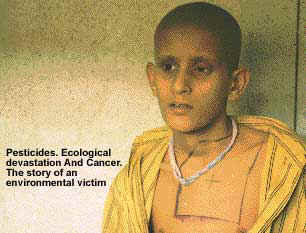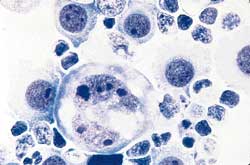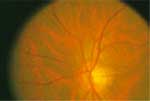As an environmental activist and writer, I have
tried for years to promote nationwide concern about the deteriorating state of our
environment. The idea of writing about my own travails as an environmental victim had,
however, never crossed my mind. But obviously, I could not have escaped what was and is
happening all around me.
Facing a Silent
Spring |

|
A young patient of
cancer at New Delhi’s All India Institute of Medical Sciences |
Cancer is a frightening word. It means a terminal disease
with periods of excruciating pain. And the treatment, full of poisons, is often as
horrific as the disease itself. So how would you feel if you are told that you are
suffering not just from cancer, but from such an extremely rare form of it that there is
hardly any treatment available? That it has already invaded both your eyes, formed a small
tumour in the centre of your brain so that it cannot even be surgically removed without
cutting up the brain completely and has even reached your spinal cord? And that as the
cancer grows in the eyes, the mass of cancerous cells will pull out the retina in both
your eyes and make you go permanently blind; the tumour in the brain will grow to put
pressure on the brain and cause strokes, among other things; and the malignant cells in
the spinal cord could affect the various nerve endings attached to the cord any time and
cause you acute pain and/or irreversibly paralyse parts of your body? The end of all this
suffering will, of course, be death. Maybe not more than a year later, but a large part of
that year could be spent in bed groping in darkness and pain.
What’re lymphomas?
Lymphomas are cancers that develop in the lymphatic system. They are parts of
what are called lymphoid malignancies — lymphomas and leukaemias. The most common
type is called Hodgkin’s disease; the rest are Non-Hodgkin’s Lymphomas. The
lymphatic system is part of the body’s immune system, consisting of lymphatic vessels
carrying lymph, a watery fluid that contains infection-fighting white blood cells or
lymphocytes. |
 |
Terrifying prospects, as you will agree. These were the
prospects I faced in early
1994. And they were enough to make me think how merciful was God to those whom he let die
peacefully in their sleep.

|

|
| Fluorescin angiogram of left
eye before treatment (left): a cloud over the retina — sheet of cancer cells —
hides it and makes the author blind in the left eye. Following chemotheropy, vitrectomy
and radiation treatment, retina can be seen again, making vision possible |
In early 1994, I faced
the prospects of blindness, neurological disorders and death
Failing to find even a diagnosis for the symptoms in my eyes
— black lines inside my left eye so that I could hardly see from it — in India,
I was finally referred to the National Eye Institute in usa, whose scientists after
diagnosing ocular and central nervous system Non-Hodgkin’s Lymphoma (nhl), referred
me to their prestigious sister institution, the National Cancer Institute (nci). I learnt
that the black lines in my eyes were cancer cells which had formed a sheet in front of the
retina.
Table 1 Placing Cancer
Age-adjusted cancer incidence rates (per 100,000 persons) |
Urban
centres |
Rural
centres |
| Year |
Bangalore |
Mumbai |
Madras |
Delhi |
Bhopal |
Barsi |
| |
M |
F |
M |
F |
M |
F |
M |
F |
M |
F |
M |
F |
| 1982 |
100.2 |
129.0 |
119.9 |
111.2 |
81.6 |
108.1 |
|
|
|
|
|
|
| 1983 |
92.5 |
116.2 |
116.5 |
106.3 |
88.7 |
121.9 |
|
|
|
|
|
|
| 1984 |
90.6 |
116.3 |
123.9 |
113.8 |
87.6 |
120.0 |
|
|
|
|
|
|
| 1985 |
98.7 |
108.7 |
129.5 |
122.9 |
92.2 |
128.3 |
|
|
|
|
|
|
| 1986 |
97.0 |
115.9 |
128.5 |
120.9 |
101.3 |
135.7 |
|
|
|
|
|
|
| 1987 |
110.7 |
129.5 |
130.4 |
118.8 |
104.4 |
133.4 |
|
|
|
|
|
|
| 1988 |
114.6 |
132.3 |
129.6 |
122.7 |
125.2 |
129.7 |
116.8 |
133.5 |
98.1 |
98.7 |
55.4 |
52.2 |
| 1989 |
112.2 |
124.7 |
130.4 |
120.4 |
118.5 |
135.0 |
118.8 |
140.7 |
106.2 |
100.1 |
57.6 |
52.2 |
| 1990 |
113.9 |
139.8 |
138.9 |
124.9 |
116.5 |
136.2 |
125.1 |
143.6 |
107.5 |
101.2 |
56.2 |
58.3 |
| 1991 |
115.7 |
144.6 |
132.9 |
130.8 |
121.11 |
131.4 |
119.1 |
137.1 |
|
|
55.5 |
67.3 |
M: Males F:Females
Living in polluted cities more than doubles the chances of developing cancer, as compared
to living in rural areas |
Fortunately, doctors at NCI had an experimental chemotherapy
for the disease. They first pumped in fatal doses of a cancer drug so that it could break
past the blood-brain barrier and enter the otherwise well-protected central nervous system
and eyes in quantities sufficient to kill the cancer cells. They had to immediately follow
up with an antidote to save me from dying. The treatment gave me an year’s blissful
‘remission’ (a period without measurable cancer). After an year, in late 1995,
the cancer cells returned. I was faced once again with the prospect of blindness,
neurological disorders and death.
Table 2 Placing NHL
Age-adjusted NHL incidence in India (per 100,000 people) |
Urban
centres |
Rural
centres |
| Year |
Bangalore |
Mumbai |
Madras |
Delhi |
Bhopal |
Barsi |
| |
M |
F |
M |
F |
M |
F |
M |
F |
M |
F |
M |
F |
| 1982 |
3.1 |
1.4 |
2.6 |
1.8 |
2.3 |
1.0 |
|
|
|
|
|
|
| 1983 |
3.1 |
1.6 |
3.4 |
2.0 |
1.8 |
1.2 |
|
|
|
|
|
|
| 1984 |
3.4 |
1.7 |
3.3 |
2.4 |
2.0 |
0.8 |
|
|
|
|
|
|
| 1985 |
2.9 |
1.0 |
4.1 |
2.0 |
3.2 |
1.3 |
|
|
|
|
|
|
| 1986 |
3.2 |
2.5 |
3.6 |
2.3 |
2.7 |
1.8 |
|
|
|
|
|
|
| 1987 |
1.7 |
2.0 |
4.4 |
2.8 |
3.4 |
0.9 |
|
|
|
|
|
|
| 1988 |
4.2 |
1.3 |
3.1 |
2.6 |
3.5 |
1.7 |
5.0 |
2.3 |
0.5 |
1.1 |
0.0 |
0.0 |
| 1989 |
3.1 |
2.1 |
4.0 |
3.0 |
3.9 |
1.8 |
5.1 |
2.4 |
0.5 |
0.5 |
1.9 |
2.0 |
| 1990 |
5.0 |
2.4 |
4.4 |
2.4 |
4.2 |
2.1 |
4.5 |
3.3 |
2.1 |
1.7 |
0.6 |
0.0 |
| 1991 |
3.7 |
0.5 |
4.0 |
3.1 |
3.6 |
2.2 |
4.8 |
3.3 |
|
|
1.1 |
1.2 |
M: Males F:Females
Delhi has the highest incidence of Non-Hodgkin’s Lymphoma (NHL), followed by Mumbai |
|

